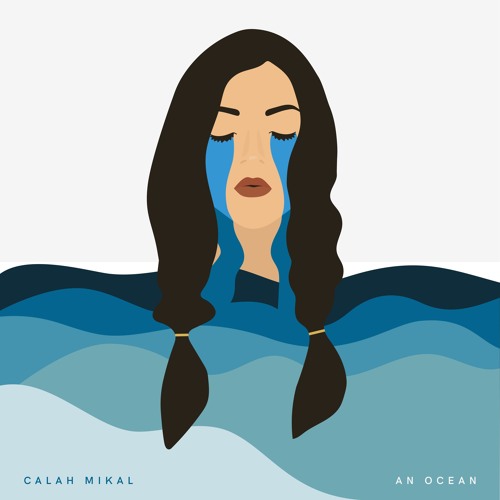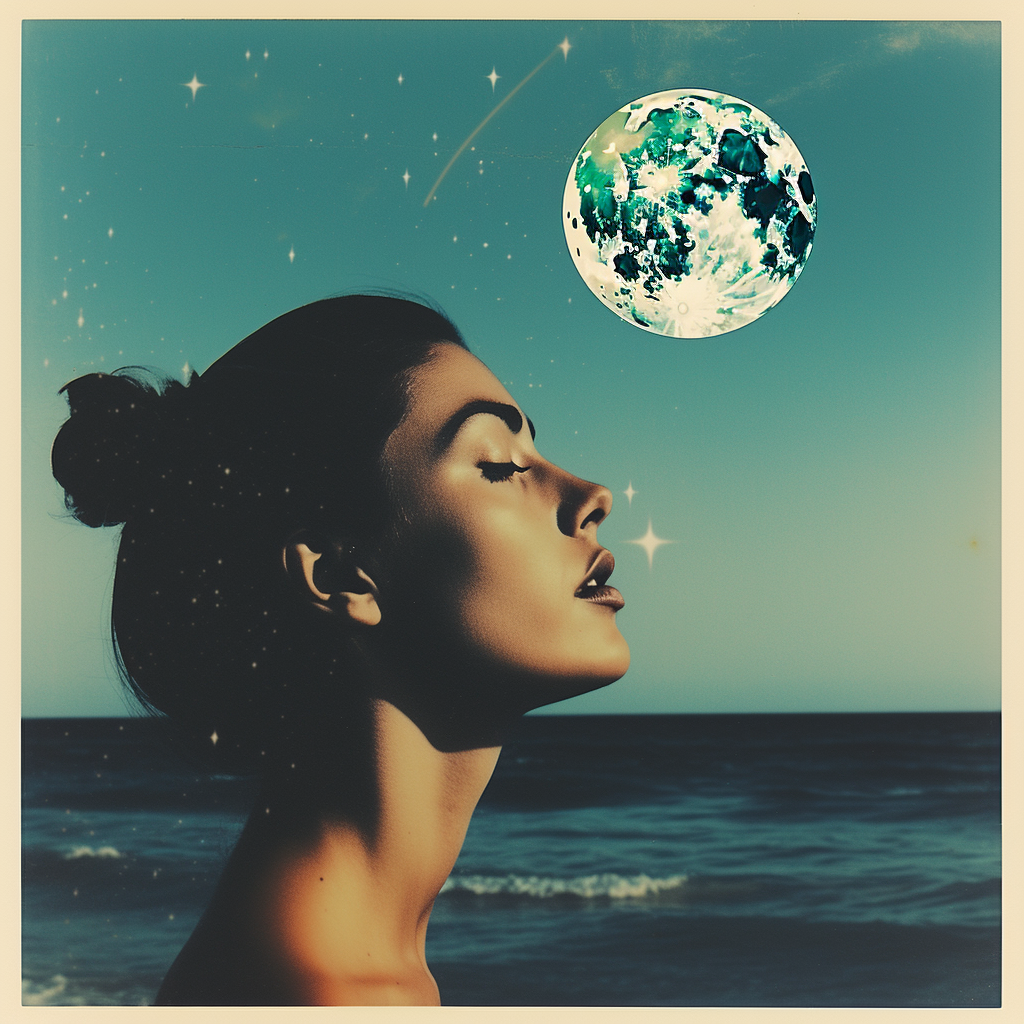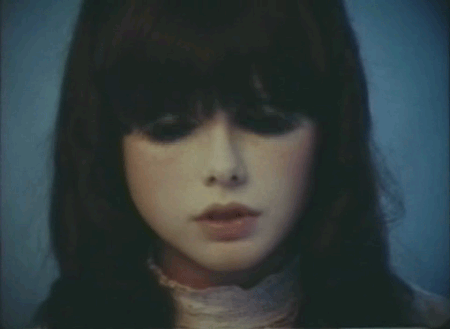
Moon-Neptune Aspects: A Super Sensitive Soul
 The Moon conjunct, square, or opposite Neptune, create a soul that’s not just sensitive but almost otherworldly in its depth of perception. Imagine living with your emotional radar set to “extreme sensitivity.” The Moon is luminary guardian of our inner world, governing how we feel, how we react, and how we nurture. Then Neptune, the great dream-weaver, floats in like a fog, blurring the lines between reality and fantasy, between what’s felt and what’s imagined. Put them together, and you get a person who doesn’t just feel emotions—they swim in them, often in the deep end where most of us fear to tread. Now, this isn’t just about being a bit more compassionate or having a good cry during a sad film. This is full immersion in the emotional ocean. These individuals are like human sponges, absorbing the vibrations of the world around them, feeling not just their own emotions but the unspoken, sometimes unfathomable, feelings of others. They’re the ones who can walk into a room and sense the tension before a word is spoken, who can offer comfort because they genuinely understand what’s beneath the surface. It’s a gift, but like all gifts, it comes with its challenges.
The Moon conjunct, square, or opposite Neptune, create a soul that’s not just sensitive but almost otherworldly in its depth of perception. Imagine living with your emotional radar set to “extreme sensitivity.” The Moon is luminary guardian of our inner world, governing how we feel, how we react, and how we nurture. Then Neptune, the great dream-weaver, floats in like a fog, blurring the lines between reality and fantasy, between what’s felt and what’s imagined. Put them together, and you get a person who doesn’t just feel emotions—they swim in them, often in the deep end where most of us fear to tread. Now, this isn’t just about being a bit more compassionate or having a good cry during a sad film. This is full immersion in the emotional ocean. These individuals are like human sponges, absorbing the vibrations of the world around them, feeling not just their own emotions but the unspoken, sometimes unfathomable, feelings of others. They’re the ones who can walk into a room and sense the tension before a word is spoken, who can offer comfort because they genuinely understand what’s beneath the surface. It’s a gift, but like all gifts, it comes with its challenges.
Living with this sensitivity can sometimes feel like being caught in a storm of emotions—yours, theirs, everyone’s. The boundaries between self and other, between reality and the imagination, can become as nebulous as a dream. This can lead to confusion, escapism, and even a kind of emotional exhaustion if not handled well. It’s a bit like being a psychic sponge: incredible for connecting with the deeper layers of existence, but overwhelming when the weight of the world’s sorrows start soaking in. But let’s not just dwell on the challenges. This aspect also brings the kind of creativity and spiritual insight that can only come from a deep, almost mystical connection to the universe. These are the poets, the dreamers, the healers—people who see beauty in places others overlook, who find meaning in the mundane, and who can guide others through the murky waters of life with a gentle, intuitive touch. When grounded, they can channel this sensitivity into art, healing, and a deep, compassionate understanding of the human condition.
This the Super Sensitive Soul, caught in the stormy seas of human experience with a heart so open, it feels as though it could absorb the entire universe. It’s both a blessing and a burden, isn’t it? To feel so deeply, to perceive the world not just in vivid color, but in shades of emotion that most can barely fathom. The gift is profound—an ability to tap into the universal wellspring of creativity, to express the ineffable, to bring beauty into a world often starved of it. But with this gift comes the weight of it all, the challenge of not drowning in the very depths that inspire. You see, these souls are the artists, the poets, the musicians who turn pain into beauty, who transform the raw material of human experience into something transcendent. They capture the universal themes—love, loss, longing, joy—in ways that can make us feel seen, understood, and connected. This is the true power of their sensitivity: the ability to channel it into something that not only heals them but also touches the lives of others.
But there’s a shadow side, as there always is with such potent gifts. The intensity of their emotions can sometimes feel overwhelming, like trying to contain an ocean in a teacup. The world can be harsh to those who feel everything so keenly, and it’s easy to see why some might retreat into fantasy, into daydreams, or into the comforting arms of escapism. After all, when reality feels too sharp, too jagged, why wouldn’t one seek refuge in the soft, nebulous realms of the imagination?
Self-doubt, anxiety, and the ever-present lure of self-sabotage can creep in, whispering that perhaps they’re too much, too fragile, too different. But it’s important to remember that this sensitivity, this intense connection to the emotional and spiritual currents of life, is not a flaw—it’s a superpower. Like any power, it requires care, attention, and sometimes a bit of self-compassion. So, how does one handle these intense emotional currents without being swept away? Grounding is key. Finding practices that anchor them in the here and now, or simply spending time in nature can help keep the waves of emotion from becoming overwhelming. Creative expression is another lifeline. When they channel their feelings into art, music, writing, or whatever medium calls to them, they transform their sensitivity from a source of pain into a source of healing, both for themselves and others. And perhaps most importantly, they need to create a sense of inner safety—a place within themselves that is unshakeable, where they can retreat and recharge. This could be a literal space, like a cozy corner of a room, or a mental escape, built from memories, affirmations, or even visualizations. Because while the world needs their sensitivity, their empathy, and their unique perspective, they need to remember that they deserve to feel safe and cared for in return.
This aspect does seem to have veil of qualities often considered feminine—gentleness, nurturing, and a deep well of intuition. It’s like carrying a chalice of pure, unfiltered emotional energy, which, whether one identifies as male, female, or any place in between, enriches the character with a soulful resonance. Women with this aspect may radiate a softness that’s endearing, drawing others to them with their kindness and nurturing spirit. They might be the type who can soothe a friend’s anxiety with just a few words, or who seem to instinctively know what’s needed in any given moment. But with this great gift of empathy comes a challenge: the potential to become too reliant on others for emotional security. It’s easy to see how someone so attuned to the needs of others might forget to attend to their own needs, or how they might seek validation from a partner to affirm their worth.
The key here, for both men and women, is balance. This beautiful, nurturing energy is a gift, but it needs to be matched with a strong sense of self, with the ability to stand alone emotionally without feeling lost or adrift. Relationships should be enriching, adding to their already abundant emotional reservoir, rather than being the sole source of it. Independence doesn’t mean closing off or becoming hardened—far from it. It’s about recognizing that while connections with others are vital, the most important relationship is the one you have with yourself. When these sensitive souls learn to nurture their own emotional needs with the same care they extend to others, they become unstoppable. They’re able to give from a place of fullness rather than need, and their relationships become balanced, reciprocal, and deeply fulfilling.
First and foremost, establishing emotional boundaries is not just advisable, it’s essential. These souls are like emotional sponges, soaking up the feelings and energies around them until they’re dripping with other people’s problems. It’s as if they’ve got a hotline to everyone else’s inner world, which is lovely for connecting on a deep level but can be exhausting if not managed well. To protect their own emotional health, they need to learn when to say “enough.” This doesn’t mean becoming cold or indifferent; it simply means recognizing that they can’t carry the weight of the world on their shoulders. Finding like-minded individuals who understand and appreciate their sensitivity can make a world of difference. These connections provide a safe space where they can be fully themselves without fear of judgment or misunderstanding. It’s like having a support group for the soul, a place where they can recharge and be understood.
But perhaps the most significant challenge for them is learning not to lose themselves in others. Their empathetic nature makes them natural caregivers, but they must remember that they can’t pour from an empty cup. They need to prioritize their own well-being, ensuring that they’re not just giving but also receiving care and support. This might mean occasionally stepping back from those in crisis, saying no when they need to, or simply taking time for themselves without feeling guilty. It’s about striking that perfect balance between being open to the world’s wonders and sorrows while maintaining a strong sense of self—remaining soft-hearted yet resilient, compassionate yet self-protective. And in doing so, they’ll not only thrive in their own lives but also bring much-needed light and understanding to the lives of others.
When reality feels too harsh, too sharp, or simply too overwhelming, it’s all too tempting for these sensitive souls to drift away on a sea of dreams, fantasies, or, in darker moments, substances that promise temporary relief. After all, with Neptune’s foggy, ethereal influence combined with the Moon’s deep connection to the subconscious, their inner world can seem infinitely more inviting than the sometimes harsh realities of life. Daydreaming and creating elaborate fantasies can become second nature, a refuge from the emotional torrents that they experience daily. In these imagined worlds, they find comfort, safety, and the freedom to explore their feelings without judgment or consequence. It’s not just an escape; it’s where their rich inner lives can be expressed without the constraints of the external world. For many, this imaginative retreat becomes a fertile ground for creativity, birthing art, literature, music, and drama that resonates with a depth that others might struggle to reach.
But while their imagination fuels their creative gifts, it can also lead them down paths of self-destructive escapism. When the intensity of their emotions becomes too much, some might turn to substances—cigarettes, pills, alcohol, you name it—to numb the feelings that threaten to overwhelm. These substances offer a quick and easy escape, a way to dull the sensitivity that, at times, can feel like a curse rather than a gift. The oceanic pull of Neptune can be intoxicating, drawing them deeper into a world of illusions where the lines between reality and fantasy blur. But as they drift further from the shore of the real world, they risk losing themselves in the currents of their own making. This is where the danger lies—not in the dreaming itself, but in the potential to become so lost in those dreams that the real world begins to fade, and with it, their ability to function and thrive within it.
Yet,this same deep well of imagination and emotional depth can be their salvation. By channeling their escapist tendencies into creative expression, they can transform what could be a destructive force into something beautiful and healing. Art, in any form, becomes a lifeline—a way to process and release emotions, to make sense of the chaos within, and to share that journey with others in a way that inspires and connects.
The bittersweet yearning of the Moon-Neptune soul is a longing that feels almost otherworldly, like a call from the stars to transcend the mundane and touch the divine. It’s an ache, a craving for a bliss that seems always just out of reach, like trying to grasp a wisp of smoke. This deep inner longing drives them to seek out experiences that might momentarily fill that void, but which too often lead them down darker paths. The desire for this elusive sense of fulfillment can become all-consuming, pushing them to chase intense experiences that promise a taste of the ecstasy they crave. For some, this might manifest in fantasies that grow so elaborate they begin to eclipse reality, or in risky behaviors that offer a brief escape but leave behind a trail of emotional wreckage. Whether it’s through sexual encounters that blur the lines between connection and self-destruction, or through substance abuse that numbs the pain for a moment but deepens it in the long run, the lure of these “highs” is powerful—and dangerous.
The danger lies in the fact that these intense experiences, while momentarily intoxicating, are ultimately hollow. They promise fulfillment but deliver emptiness, leading to a cycle of craving and disappointment that can be hard to break. This is the shadow side of the Moon-Neptune connection—the risk of becoming so caught up in the pursuit of transcendent experiences that they lose touch with the grounding realities of life, and with their own true needs. But this yearning, this deep desire for something more, isn’t something to be extinguished. It’s part of what makes them who they are, a reflection of their profound sensitivity and their connection to the spiritual, the imaginative, the beyond. The key is not to deny this longing, but to channel it in ways that are creative rather than destructive.
Perhaps most importantly, they must learn to find joy and fulfillment in the simple, everyday moments of life. The beauty they seek isn’t only in the extraordinary; it’s also in the ordinary, in the quiet moments of connection with others, in nature, in the stillness of the mind. Learning to appreciate these moments can help ease the constant longing for something more, bringing a sense of peace and contentment that is sustainable.
Neptune sensitizes the feeling Moon and tends to dissolve its boundaries so that it can be difficult to separate one’s feelings from the feelings and needs of others. Highly and involuntarily emphatic, the conjunction shows a need to merge with others and sometimes to heal and relieve their suffering. Establishing personal boundaries and saying no to others is a challenge and tends to create guilt. Because of the merging, oceanic quality of feeling, there’s often a markedly psychic streak. The tendency to indulge and even spoil others may lead to a feeling of being victimized or drained. Character and Fate: The Psychology of the Birthchart (Arkana’s Contemporary Astrology Series)
Moon-Neptune individuals are hypersensitive and often exhibit psychic or intuitive abilities that can be difficult to explain. Many of their dreams and premonitions may seem prophetic, and they can have a profound understanding of people and situations beyond the rational and logical realm. However, this heightened sensitivity also means that they can easily become overwhelmed by the emotional intensity of life. The chaotic nature of feelings and emotions may leave them feeling adrift and struggling to sort through their internal landscape. Experiencing bouts of intense sadness or even depression, at times, it may be challenging for them to find clear answers or solutions to their emotional turmoil.
The Moon-Neptune individual is a soul so porous, so open, that their emotional sphere is like a sieve, absorbing every drop of feeling from those around them. It’s as if they were born without the layer of skin that most of us have, the one that keeps the outside world at bay, allowing us to maintain a bit of distance between our emotions and the emotions of others. Instead, they live in a world where the lines between their feelings and those of the people around them are blurred, if not entirely erased. This emotional permeability allows them to connect with others in a way that is truly profound. Their empathy isn’t just a surface-level understanding; it’s a full-bodied, heart-deep immersion in the emotional experiences of others. They don’t just see someone’s pain—they feel it, as if it were their own. This makes them incredibly caring, compassionate, and attuned to the needs of those around them. They’re the ones who’ll drop everything to be there for a friend in need, who’ll sacrifice their own comfort to ease someone else’s burden. This kind of selflessness is a beautiful thing, a testament to the depth of their love and their commitment to the well-being of those they care about. But this selflessness can also become a stumbling block. When they constantly prioritize the needs of others over their own, when they absorb others’ emotions without a filter, they can easily lose themselves in the process. In their personal relationships, this can lead to patterns of co-dependency, where they become so focused on taking care of others that they neglect their own needs and desires.
The Moon-Neptune individual often finds themselves tiptoeing around their own feelings, communicating not through bold declarations, but through the gentle ripples of non-verbal cues. It’s as if their emotions are cloaked in mist, only partly revealed, making them masters of subtlety but also prisoners of their own unexpressed depths. The root of this struggle often lies in the soil of early childhood, where the seeds of shyness and introversion were planted, watered by the atmosphere of the home. If they grew up in an environment where emotional expression wasn’t encouraged—or worse, was met with indifference or disapproval—they learned early on to keep their feelings hidden. The need to maintain harmony, to avoid conflict, became paramount, and so they developed an instinctive reluctance to burden others with their emotions. The thought of expressing their needs openly might even fill them with guilt, as if doing so would upset the delicate balance they’ve learned to preserve.
The mother figure, represented by the Moon in astrology, takes on a particularly poignant role in this dynamic. With Neptune in the mix, the image of the mother can be one of sacrifice, self-pity, or quiet suffering—a figure who perhaps didn’t need to say much to communicate her own burdens. This archetype of the martyr mother can be deeply impactful, shaping the individual’s emotional landscape. For the Moon-Neptune individual, the mother might have been someone whose moods were as changeable as the tides, someone whose unspoken expectations hung heavy in the air. Whether consciously or unconsciously, the mother’s emotional state became the barometer for the household’s atmosphere. And so, this sensitive soul learned to tiptoe around her feelings, suppressing their own to avoid adding to her burden, or perhaps to escape the guilt that came from feeling they were somehow responsible for her struggles.
This early conditioning can leave deep imprints, making it difficult for them to assert their own needs later in life. The guilt, the fear of causing harm, can become internalized, leading them to believe that their emotions are too much, that they should keep their feelings under wraps to avoid upsetting others. It’s a heavy load to carry, and it can result in a pattern of emotional suppression that stifles their own well-being. But while their sensitivity is a gift, it shouldn’t come at the cost of their own emotional health. The journey for these individuals is about reclaiming their right to feel and express their emotions openly, without guilt or fear. This isn’t easy, especially when they’ve been conditioned to believe that doing so might harm those they care about. But it’s essential for their growth and happiness.
One of the first steps in this journey is recognizing that their emotions are valid, and that they have a right to express them. It might help to start with small, safe steps—perhaps through writing or creative expression, where they can explore their feelings in a way that feels less confrontational. Over time, this practice can build their confidence, helping them to gradually share their emotions more openly with others. It’s also important for them to differentiate between their emotions and those of the people around them. Because they’re so attuned to others’ feelings, they might unconsciously absorb and internalize emotions that aren’t theirs, mistaking them for their own.
When the Moon, symbolizing the mother, meets Neptune, the planet of dreams, illusions, and escapism, the mother figure can take on a range of identities—some nurturing, others shadowed by sorrow, loss, or addiction. In cases where the mother was unable to provide the stability and care that the child needed, perhaps due to her own struggles with mental illness, physical weakness, or addiction, the child often grows up in an atmosphere charged with uncertainty and emotional turbulence. The early environment might have been one where the child had to cope not only their own feelings but also the mother’s unresolved issues, leading to a premature emotional maturity, or conversely, a deep need to escape. This escape might take the form of retreating into their imagination—a place where they could control and create a world that was safer, kinder, and more predictable than the one they were living in.
Such experiences can leave deep imprints, and a sensitivity that is both a gift and a challenge. The emotional wounds from these early years can make them prone to seeking comfort in the dreamy realms of Neptune, where the harsh edges of reality are softened and where they can connect with something more transcendent. But this same sensitivity can also lead to a vulnerability to escapist behaviors, where they might turn to substances, fantasy, or other means to avoid the pain that still lingers from their past. On the flip side, if the mother was exceptionally creative and nurturing, she might have encouraged the child’s imaginative and artistic talents, creating a strong connection through shared dreams and creative pursuits. This kind of bond can be incredibly enriching, filling the child with a deep love for the arts, spirituality, or any Neptune-ruled domain. But even in this more positive scenario, the relationship could still carry its own set of challenges. The mother’s oversensitivity, or her own tendencies toward escapism, might have been mirrored in the child, creating a dynamic where both struggled to maintain healthy emotional boundaries.
In either case—whether the mother was struggling with her own inner storms or was a nurturing yet deeply sensitive figure—understanding this relationship is key to the Moon-Neptune individual’s healing journey. Through this healing process, they can begin to recognize how these early experiences have shaped their emotional world, and how they might be repeating patterns that no longer serve them. For instance, they might discover that their tendency to sacrifice their own needs for others, or their inclination to escape into fantasy, are directly linked to the ways they learned to cope as children. By bringing these patterns into consciousness, they can start to make different choices—choices that honor their own needs and boundaries while still embracing their natural empathy and creativity.
In the end, the Moon-Neptune individual’s journey is one of integration—bringing together their rich inner world with the demands of the external one. By understanding and healing the early wounds tied to their relationship with their mother, they can move forward with a greater sense of wholeness, expressing both their sensitivity and their strength. Through this balance, they can live fully and creatively, using their gifts not just to escape the world, but to engage with it in a way that is both meaningful and fulfilling.



















 Moon-Pluto Synastry: Soul Mate or Soul Trap?
Moon-Pluto Synastry: Soul Mate or Soul Trap?
 Mars Conjunct Pluto Synastry
Mars Conjunct Pluto Synastry
 Pisces As a Teenager
Pisces As a Teenager
 Moon Conjunct Pluto Synastry
Moon Conjunct Pluto Synastry
 Extreme Self-Consciousness in Astrology?
Extreme Self-Consciousness in Astrology?
 Sun Square Pluto Synastry: You’ve Got That Power Over Me
Sun Square Pluto Synastry: You’ve Got That Power Over Me
 Moon Conjunct Pluto Natal Aspect: Emotional X-Ray Vision – Seeing Through Souls Since Birth
Moon Conjunct Pluto Natal Aspect: Emotional X-Ray Vision – Seeing Through Souls Since Birth
 For Those with Saturn Strong: Learning When to Stop Pushing the Boulder Up the Hill
For Those with Saturn Strong: Learning When to Stop Pushing the Boulder Up the Hill
 Full Moon in the 8th House: A Journey of Deep Introspection
Full Moon in the 8th House: A Journey of Deep Introspection
 Mars in Aquarius: Sex drive
Mars in Aquarius: Sex drive
 Venus-Pluto Synastry: A Love So Powerful That It Might Just Kill Them
Venus-Pluto Synastry: A Love So Powerful That It Might Just Kill Them
 Mars-Saturn Synastry: The Eternal Loop
Mars-Saturn Synastry: The Eternal Loop
 Uranus Transits: 1st House: Winds of Change:
Uranus Transits: 1st House: Winds of Change:
 Sun Conjunct Pluto Synastry: Enlightening or Annihilating
Sun Conjunct Pluto Synastry: Enlightening or Annihilating
 Scorpio’s Cold Withdrawal
Scorpio’s Cold Withdrawal
 Scorpio: Sex and Revenge – You’ll Get What’s Coming To You
Scorpio: Sex and Revenge – You’ll Get What’s Coming To You
 Sun Trine Pluto Natal Aspect: The Quiet Powerhouse
Sun Trine Pluto Natal Aspect: The Quiet Powerhouse
 Reflections on a Past Venus-Pluto Synastry Aspect
Reflections on a Past Venus-Pluto Synastry Aspect
 Pluto in the 7th House: Opening Pandora’s Box
Pluto in the 7th House: Opening Pandora’s Box
 Moon-Saturn Synastry
Moon-Saturn Synastry